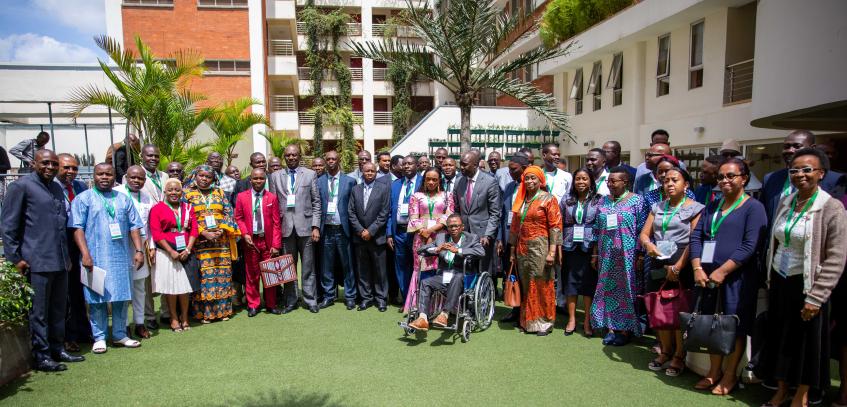The Economic, Social and Cultural Council (ECOSOCC) has constituted and inaugurated its 4th Permanent General Assembly (PGA). The General Assembly is the highest decision and policy making body of ECOSOCC composed of: Two CSOs from each African Union member State; Ten CSOs operating at regional level and eight at continental level; and CSOs from the African Diaspora.
The ECOSOCC General Assembly has a tenure of four years. The 3rd Permanent General Assembly was constituted in December 2018. The new elected members of the GA will in turn elect a bureau comprising the Presiding Officer, Deputy Presiding Officers and chairs of sectoral cluster Committees.
Officially inaugurating the PGA yesterday, Principal Secretary in the Department of Foreign Affairs, Dr. Abraham Sing’oei, speaking on behalf of Dr. Alfred Mutua, Cabinet Secretary in the Ministry of Foreign and Diaspora Affairs congratulated the newly elected members of the ECOSOCC General Assembly and urged them to take the mantle of leadership to develop the continent.
He underscored the valuable contribution that Civil Society Organizations under the leadership of ECOSOCC had made in enhancing African ownership of its peace and security agenda.
“This is well demonstrated by the integrated approach through which a number of AU member states in collaboration with ECOSOCC combine efforts in conflict prevention, management and resolution, as well as post-conflict stabilization and reconstruction,” Dr. Mutua said.
He reiterated Kenya’s support of ECOSOCC in fulfilling its mandate of actively engaging civil society on the continent in the processes and work of the AU, particularly with regards to Africa’s integration and development.
AUC Chairperson, H.E Moussa Faki, represented by the Technical Advisor on Regional Integration in the Bureau of the Chairperson, Amb. Rosette Nyirinkindi assured the GA that the AU would continue to provide platforms and tools to CSOs so that they could play their crucial role in helping to achieve the goals and aspirations of the AU’s Agenda 2063.
Outgoing ECOSOCC Presiding Officer, Mr. Denise Kodhe gave a recap of his tenure as Presiding Officer of the 3rd ECOSOCC PGA. He urged the new membership of the 4th PGA to play a bigger role in advancing the goals and aspirations of the AU and ECOSOCC.
Vice-President of the Section for External Relations, the European Economic and Social Committee (EESC) Mr. Peter Clever stressed that sustainable development should be rooted deeply in society, that is, people and not governments.
He applauded the youth representation in the elected PA and noted that it translated into formal representation by young people in shaping the programs and policies of the union.
Mr. Clever said the EESC attaches the utmost importance to its partnership with the AU ECOSOCC.
Mr. William Carew, Head of ECOSOCC Secretariat, emphasized to the newly elected GA members that their role was coupled with great responsibility.
“In fact, membership in the GA is a call to service and not a license for self-aggrandizement. In this regard, ECOSOCC GA members are expected to uphold the highest standard of ethical conduct in order not to bring the institution to disrepute,” he said. “it is our collective responsibility as the ECOSOCC GA, with the administrative support of the Secretariat, to change the narrative about ECOSOCC. The ball is now firmly in your court to drive ECOSOCC to the next level of its operationalization.”
Established under the provisions of Articles 5 and 22 of the African Union’s Constitutive Act, ECOSOCC is the vehicle for building a strong partnership between governments and all segments of African civil society. The Statute of ECOSOCC, adopted by the Heads of State and Government at the Third Ordinary Session of the Assembly in July 2004 defines it as an advisory organ of the African Union composed of different social and professional groups of the Member States of the African Union [Assembly/AU/Dec.42 (III)].
The distinctive character of ECOSOCC is that it gives an opportunity for African civil society to play an active role in charting the future of the Continent, organizing itself in partnership with African governments to contribute to the principles, policies and programmes of the Union.





